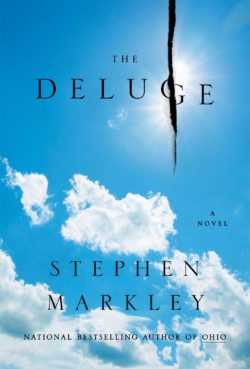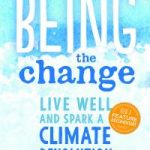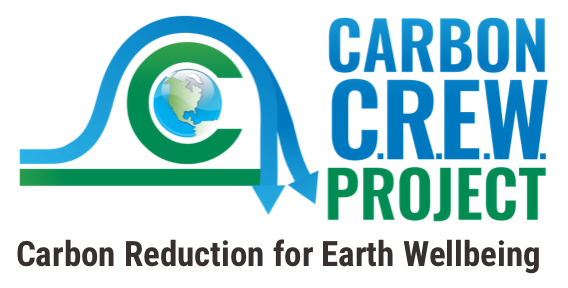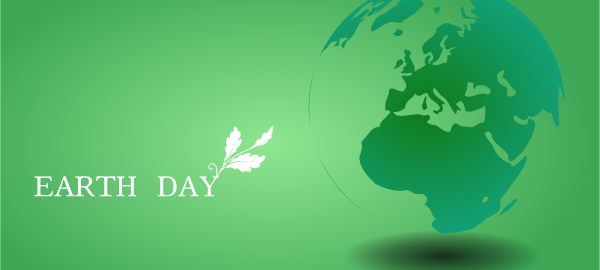Podcast: Play in new window | Download
Subscribe: Apple Podcasts | RSS
How can we make the change we need to save our future?
I spent a lot of time studying how we as collective agents of history have helped foment enormous change and also how we have failed at it. That was another important element, to look at the revolutions that did not work. Because unlike basically every one of those revolutions, this is something we can’t miss on. We’re not going to get a do-over on this. It’s now or never. — Stephen Markley
We talk with Stephen Markley about his acclaimed new novel about the climate crisis, The Deluge. It lays out the different paths that may be taken to changing the political will to tackle climate, the unintended consequences they lead to, and the twists and turns of political, ecological and individual fates that intertwine and react with each other.
Then we talk about what we can do in our own lives to protect our planet from climate disaster. We air excerpts from our interviews with Peter Kalmus (Being The Change) and Darr Reilly of Carbon C.R.E.W.
Writers Voice— in depth conversation with writers of all genres, on the air since 2004.
Like us on Facebook at Writers Voice with Francesca Rheannon, on Instagram @WritersVoicePodcast or find us on Twitter @WritersVoice.
Love Writer’s Voice? Please rate us on your podcast app. It really helps to get the word out about our show.
We Can Solve The Climate Crisis
We have the science, the technology and the money to deal with the climate crisis. Solar and wind are the cheapest forms of energy. Yes, we can improve on the tech and drive costs even lower. But basically, we know how to get to net zero carbon emissions by 2050, which scientists tell us can avert the most catastrophic impacts of climate change.
And good news! It turns out that once the world reaches net zero, global temperatures will stop going up in as soon as three to five years. And half of human-made CO2 emissions would drop out of the atmosphere within about 30 years. We can do this.
The Real Barrier to Climate Action
So what’s stopping us? In short, political will. And the lack of political will in tackling the climate crisis is driven by two other crises: the crisis of economic inequality, which drives the crisis of democracy.
That’s the key takeaway from Stephen Markely’s brilliant and engrossing new novel, The Deluge.
Different Paths to Action on Climate
 The book lays out the different paths that may be taken to changing the political will to tackle climate, the unintended consequences they lead to, and the twists and turns of political, ecological and individual fates that intertwine and react with each other.
The book lays out the different paths that may be taken to changing the political will to tackle climate, the unintended consequences they lead to, and the twists and turns of political, ecological and individual fates that intertwine and react with each other.
How could a pro-climate mass movement get created? What about eco-sabotage? Or electoral politics? And how do the fossil fuel interests and the politicians they control try to stop that change? Can they be resisted and overcome? And finally, how can democratic movements counter increasing authoritarianism to save our future?
These are all questions Markely explores In gripping prose and vivid characters — like Kate Morris, the charismatic leader of the mass climate movement, Fierce Blue Fire. He brings the near future into sharp focus, making the world we are moving toward vividly real.
About The Author
In addition to The Deluge, Stephen Markley is the author of the novel Ohio, and two memoirs, Iceland and Publish This Book.
Read an excerpt from The Deluge
What You Can Do To Protect The Climate & Live Better
Earth Day happens this week, a time for people to celebrate our beautiful planetary home and honor it by thinking of ways we can  protect it. We’ve taken two excerpts from past episodes that help us do just that.
protect it. We’ve taken two excerpts from past episodes that help us do just that.
First, a clip from our 2017 interview with atmospheric scientist Peter Kalmus. Last year he was arrested for locking himself onto an entrance to the JP Morgan Chase building in downtown LA. That bank is the number one funder of fossil fuel projects around the world.
But before that, Kalmus wrote a book about how to make personal choices to help protect the climate, Being The Change: Live Well and Spark a Climate Revolution. It’s not just about decreasing your own carbon footprint, but motivating other people to do the same.
Connecting Neighbors with Carbon C.R.E.W.
One way to spread the word on climate is to connect with your neighbors. That’s what a new initiative aims to help anybody do. It’s called Carbon C.R.E.W. and it was co-founded by our guest from early January of this year, Darr Reilly.
 Carbon C.R.E.W. was an outgrowth of her activism with the global climate movement called Project Drawdown, founded by Paul Hawken.
Carbon C.R.E.W. was an outgrowth of her activism with the global climate movement called Project Drawdown, founded by Paul Hawken.
Drawdown talks about 100 solutions to the climate crisis that people and communities can take on their own. And Carbon C.R.E.W. is designed to make that easy for small groups of friends and neighbors to do. Members of a Carbon Crew meet for five sessions to develop their own personal carbon reduction plan.
Since that interview that we aired in January, Carbon C.R.E.W. has upgraded its program. It’s now a turn-key process to set up and host a carbon crew, with scripts, handouts, worksheets and resources. Learn more about it here.

